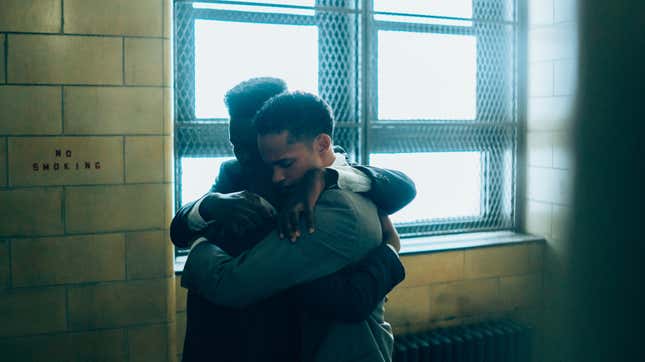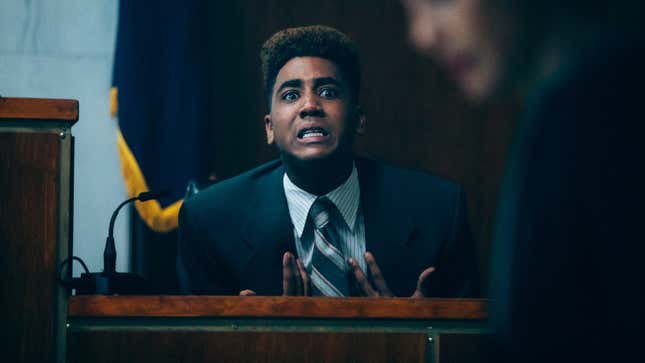
Central Park Five. It’s a name that has been bestowed upon Antron McCray, Kevin Richardson, Yusef Salaam, Raymond Santana, Jr., and Korey Wise. Five men—then teenagers—who tragically embodied the turn of phrase, “wrong place at the wrong time,” were essentially immortalized into infamy as soon as they were dubbed as such.
But, what about when we see them? As people?
Written and directed by Ava DuVernay, When They See Us, a new limited drama series from Netflix tackles just that.
Per Netflix’s press release:
Based on a true story that gripped the country, When They See Us will chronicle the notorious case of five teenagers of color, labeled the Central Park Five, who were convicted of a rape they did not commit. The four part limited series will focus on the five teenagers from Harlem — Antron McCray, Kevin Richardson, Yusef Salaam, Raymond Santana, Jr. and Korey Wise. Beginning in the spring of 1989, when the teenagers were first questioned about the incident, the series will span 25 years, highlighting their exoneration in 2002 and the settlement reached with the city of New York in 2014.
When They See Us boasts an eclectic cast: Asante Blackk (Young Kevin), Caleel Harris (Young Antron), Ethan Herisse (Young Yusef), Marquis Rodriguez (Young Freddy), Jharrel Jerome (Young /Adult Korey), Jovan Adepo (Adult Antron), Chris Chalk (Adult Yusef), Freddy Miyares (Adult Freddy), Justin Cunningham (Adult Kevin), Marsha Stephanie Blake (Linda McCray), Aunjanue Ellis (Sharon Salaam), Niecy Nash (Delores Wise), Michael Kenneth Williams (Bobby McCray), Omar J. Dorsey (Elombre Brath), Adepero Oduye (Nomsa Brath), Storm Reid (Lisa), Aurora Perrineau (Tanya), John Leguizamo (Raymond Santana, Sr.), Vera Farmiga (Elizabeth Lederer), Blair Underwood (Bobby Burns), Joshua Jackson (Mickey Joseph), Felicity Huffman (Linda Fairstein), and more.
The four-part limited series explores each facet of this unforgettable and infuriating tragedy:
- Five teenage boys “wylin” in Central Park on one fateful night leads to charges that will unknowingly change the course of their lives forever.
- The trial. The verdict (which, in and of itself, was a visual juxtaposition of heartbreaking beauty).
- Prison. Returning to life after prison (shoutout to little details, such as Adult Freddy taking a shower at home in his boxers or Yusef attempting to learn how to use a computer)
- The life, inner-death, and rebirth of Korey Wise. Freedom.
Bradford Young, who has long shown a fire-hot cinematography synergy with DuVernay (Middle of Nowhere, Selma), deftly leads the camera in a rhythmic dance, whether we’re in a dreamy “what if” sequence with Korey and his girlfriend Lisa or thrust into the disorienting and sobering interrogation room.
DuVernay orchestrates suspense like a symphony, leading the audience on a wave of tragic hope—you already know the outcome, yet you still wish for another. The script is emotionally wrought and witty, even brilliantly inserting a hint of irony at the mention of Donald Trump, who served a pivotal role in the case after purchasing a full-page ad in New York local newspapers in a targeted propaganda campaign against the young black boys.
“In 1989, five black and brown teen boys were wrongly accused of a crime they did not commit and branded The Central Park Five, a moniker that has followed them since that time,” DuVernay said in a press release of the film’s announcement. “In 2019, our series gives the five men a platform to finally raise their voices and tell their full stories. In doing so, Korey, Antron, Raymond, Kevin and Yusef also tell the story of many young people of color unjustly ensnared in the criminal justice system. We wanted to reflect this perspective in our title, embracing the humanity of the men and not their politicized moniker.”
The young actors are an exemplary compliment to their adult counterparts, who showcase the complexities of navigating that “wrong place at the wrong time” adage, but particularly, as young black boys in America. By extension, there are many kudos to be given to the parents and family members who wrestled with a number of colliding conflicts, including but not limited to broken homes, poverty, an oppressive “justice” system, transphobia, and beyond.
A special nod is due to Jerome, who managed to remarkably carry extra weight, portraying both the young and older versions of Korey. Masterfully capturing the complexities of a young boy gripped with multiple marginalized aspects of life—whether his race, class or learning disability—Jerome evolves into a star with every frame. That young man better get his arms ready for some statuettes.

When the credits roll—fittingly blaring the sounds of Nipsey Hussle—you can’t help but to sink into your seat and somehow digest the lingering lump in your throat.
When we left the screening in Los Angeles, many of us were left with the same sentiment (amid the general gutted feeling): this just may be DuVernay’s magnum opus. I’m certainly pretty confident in calling it that.
You will smile. You will be desolate. You will be incensed. You will be radicalized. You will hear the clanking of bars as they close on the boys’ innocence. You will smell the rotting of the solitary cell. You will taste the home-cooked meal of newfound freedom. You will feel the gutting of your insides as you realize what they can never reclaim. You will see the Central Park Five.
As you prep for what may be one of the emotionally wrecking experiences of your cinematic viewing life, ABC will be airing a special featuring the real men behind the “Central Park Five” moniker, 20/20: One Night in Central Park, including exclusive interviews with police involved in the case, on Friday, May 24 9:00-11:00 p.m. ET.
All four parts of When They See Us debuts on Netflix, May 31.

